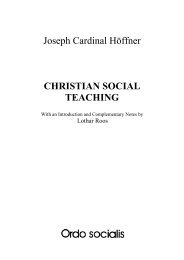Prof. Franz Josef Stegmann Bethlehem Social ... - Ordo Socialis
Prof. Franz Josef Stegmann Bethlehem Social ... - Ordo Socialis
Prof. Franz Josef Stegmann Bethlehem Social ... - Ordo Socialis
Create successful ePaper yourself
Turn your PDF publications into a flip-book with our unique Google optimized e-Paper software.
<strong>Stegmann</strong><br />
2.2 Christian responsibility for the world<br />
In the same way, Christian faith and a Christian's actions are related to politics, economic and<br />
social matters. Christians must prove themselves in economic and political life, in the secular<br />
world as such. The New Testament clearly distinguishes between the world as evil (see Jn 7,7;<br />
12,31; 1 Cor 1,20.21.27), the world as God's good creation (Act 17,24; Heb 1,10), testifying<br />
his divine nature and power (Rom 1, 19.20), revealing his glory (Mt 6,26-30: Acts 14,15-17),<br />
and the world as the sphere into which Christians are sent in order to prove themselves (Mt<br />
5.13-16; 24,14; Mk 16,15; Jn 17,18; Rom 1,8; Col 1,6). The biblical "No" against the world as<br />
evil must not be falsified to "No" against the world as such.<br />
On the contrary, biblical revelation emphasises the "independence" of "earthly affairs", and<br />
demands of Christians to prove themselves in the world, not least in political and economic<br />
life. According to their abilities, they are responsible for "temporal affairs" and have to<br />
contribute to a just shaping of human coexistence, to a just shaping of society. "The expectation<br />
of a new earth" - the Pastoral Constitution of Vatican Council Two reminds us – “must<br />
not weaken but rather stimulate our concern for cultivating this one", 17 in which we now live.<br />
Christians therefore "cannot talk about politics as a 'dirty business'" and hope or demand that<br />
God "let other people do this 'dirty business’”; the above-mentioned theologian Karl Rahner<br />
emphasised this. On the contrary, it is a Christian's duty, according his/her ability, "to work<br />
together with all in building a greater, freer, more human world". For "a worldly life without<br />
reservation honestly lived”- one may also say: a honestly lived political or economic life -<br />
"really is part of a pious life". 18 It is obvious what that insight means for the connection<br />
between faith and the secular world, for the importance of socio-political commitment.<br />
Christians are called on to prove themselves in political life, in economic life, in the secular<br />
world as such. In the final judgement we shall be asked about our contribution to the creation<br />
of a more human world: I was hungry, thirsty, naked - maybe it should be added nowadays: I<br />
was unemployed, a refugee, unborn - What did you do? Did you help me (sec Mt 25, 31-46)?<br />
2.3 "Critical function" of Christian revelation and Church<br />
The Gospel does not state in detail how to solve political, economic or any other "earthly"<br />
problems here and now. But the revelation might have an important "critical function" for<br />
Christian behaviour and action in the world. Jesus proclaimed that liberty, justice, peace, and<br />
reconciliation will be in his heavenly kingdom. These "eschatological promises of salvation"<br />
belong to the very core of his message and force again and again every Christian to take on<br />
social responsibility", 19 because they cannot be individualised. There is no liberty, justice,<br />
peace and reconciliation for the single individual only.<br />
By nature, these promises are related to the social life of human beings living together, to the<br />
community. Those who want to be Christians must be committed to a free and just society, to<br />
peaceful human coexistence.<br />
Christians (and the Church) muss therefore always critically examine whether existing social<br />
conditions and whether their political and economic activities really nerve the common good.<br />
17<br />
Second Vatican Council, Pastoral Constitution (1965), Art. 39,3.<br />
18 2<br />
Karl Rahner, Frömmigkeit früher und heute, in KarlRahner, Schriften zur Theologie, Vol. 7, Einsiedeln 1971,<br />
11‐31,25f.<br />
19<br />
Johann Baptist Metz, Zur Theologie der Welt, Mainz‐München 1968, 105.<br />
11















